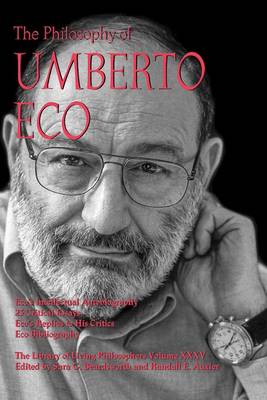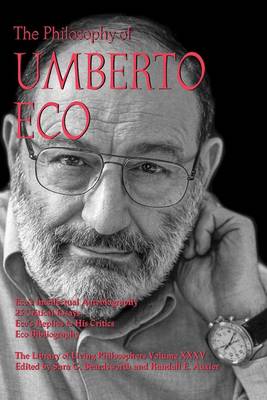
Bedankt voor het vertrouwen het afgelopen jaar! Om jou te bedanken bieden we GRATIS verzending (in België) aan op alles gedurende de hele maand januari.
- Afhalen na 1 uur in een winkel met voorraad
- In januari gratis thuislevering in België
- Ruim aanbod met 7 miljoen producten
Bedankt voor het vertrouwen het afgelopen jaar! Om jou te bedanken bieden we GRATIS verzending (in België) aan op alles gedurende de hele maand januari.
- Afhalen na 1 uur in een winkel met voorraad
- In januari gratis thuislevering in België
- Ruim aanbod met 7 miljoen producten
Zoeken
The Philosophy of Umberto Eco
€ 200,45
+ 400 punten
Omschrijving
The Philosophy of Umberto Eco stands out in the Library of Living Philosophers series as the volume on the most interdisciplinary scholar hitherto and probably the most widely translated. The Italian philosopher's name and works are well known in the humanities, both his philosophical and literary works being translated into fifteen or more languages. Eco is a founder of modern semiotics and widely known for his work in the philosophy of language and aesthetics. He is also a leading figure in the emergence of postmodern literature, and is associated with cultural and mass communication studies. His writings cover topics such as advertising, television, and children's literature as well as philosophical questions bearing on truth, reality, cognition, language, and literature. The critical essays in this volume cover the full range of this output.
This book has wide appeal not only because of its interdisciplinary nature but also because of Eco's famous "high and low" approach, which is deeply scholarly in conception and very accessible in outcome. The short essay "Why Philosophy?" included in the volume is exemplary in this regard: it will appeal to scholars for its wit and to high school students for its intelligibility.
This book has wide appeal not only because of its interdisciplinary nature but also because of Eco's famous "high and low" approach, which is deeply scholarly in conception and very accessible in outcome. The short essay "Why Philosophy?" included in the volume is exemplary in this regard: it will appeal to scholars for its wit and to high school students for its intelligibility.
Specificaties
Betrokkenen
- Uitgeverij:
Inhoud
- Aantal bladzijden:
- 920
- Taal:
- Engels
- Reeks:
Eigenschappen
- Productcode (EAN):
- 9780812699623
- Verschijningsdatum:
- 9/05/2017
- Uitvoering:
- Hardcover
- Formaat:
- Genaaid
- Afmetingen:
- 157 mm x 231 mm
- Gewicht:
- 1156 g

Alleen bij Standaard Boekhandel
+ 400 punten op je klantenkaart van Standaard Boekhandel
Beoordelingen
We publiceren alleen reviews die voldoen aan de voorwaarden voor reviews. Bekijk onze voorwaarden voor reviews.








